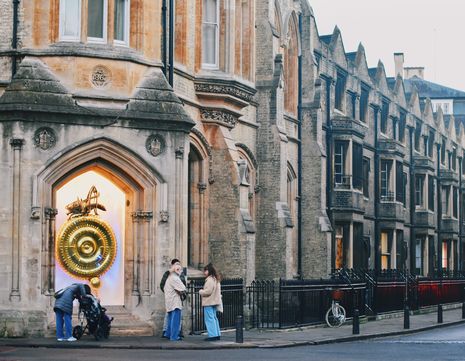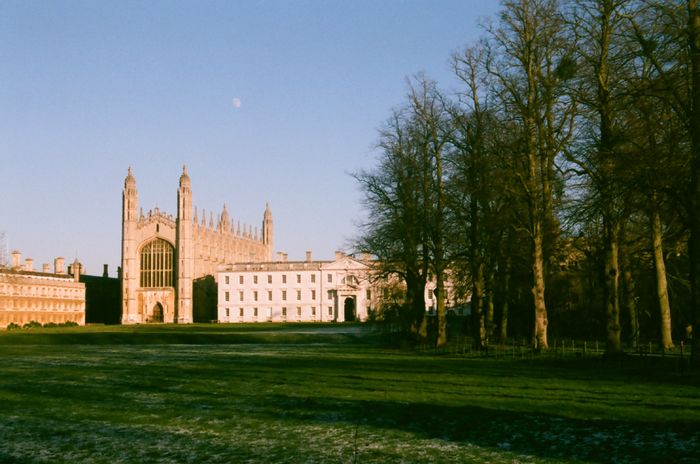A vindication of the rights of tourists
In the second edition of her column, Laura Solomon defends tourists in Cambridge from the criticisms and sneers of students

Tourism is a foundational aspect of Cambridge life. As anyone who has visited, studied or lived in the town will tell you, the weekends represent a dramatic change in the Cambridge microcosm. As cyclists became justified in their loathing and repetitious bell ringing, I realised that much of Cambridge culture revolves around a recreational exasperation at tourists. But many of us forget the necessity of tourists. After two years, they have returned, along with a feeling of life becoming as normal as Cambridge can be.
I think the anti-tourist sentiment that lingers throughout the student body is worth exploring. Like many parts of Cambridge life, it binds those who are ‘in’ against those who are ‘out’. Much student discourse about tourists seems to come from a place of elitism and a complex of superiority. Despite the superficial annoyance, the subtext is clear. We are the centre of attention and we are what this is all for.
“Much student discourse about tourists seems to come from a place of elitism and a complex of superiority”
Not only this, but I think much of the anti-tourist rhetoric provides a dog whistle for xenophobia with the villainisation of Asian tourists. The nerve that goes along with the fact that we, as students who (for the most part) are not native Cambridge residents, criticise tourists, is absolutely stupefying. We are barely here for half the year and yet our colleges and Cambridge become part of our identity. Suddenly, we become defensive and flout ownership. We laugh at the selfie sticks and overpriced ‘University of Cambridge’ merch because we have the real thing. We have worked to make this place ours.
Tourists make up a huge aspect of the social and financial fabric of Cambridge. For many, the city is overrun with gimmicks and is cheapened, with tourists corrupting the tranquillity of Cambridge life. But with Covid-19 and a series of successive lockdowns, the tourists went home, leaving the city deserted. The market closed, the punts retired and the streets of Cambridge became silent, deafeningly so. Not only is the effervescent atmosphere that the tourists bring irreplaceable, but it compliments the students, shaping city life. Over-merchandised, overcrowded and perhaps overhyped, but also financially supported. The visitor economy is a key economic driver for Cambridge with 8.1 million visitors a year contributing around £835 million to the Cambridge economy and accounting for around 22 per cent of local employment.
“The same Cambridge tourists see, is the very one we aspired to during that year-long application process”
I am surprised at my own annoyance at tourists. How ironic of me to see the very people who pump life into this city, like mosquitos, in so many ways, as sucking the joy out of my experience as I attempt to go another weekend not caught in the background of a photo. But then again, maybe my annoyance isn’t at them but rather at what they symbolise, as they wonder upon the imagined life of a Cambridge student. That’s what I thought I would be doing all day. I’d have brunch at Fitzbillies, followed by leisurely strolls, perusing Waterstones, the odd punt and perhaps a formal if I can be bothered to don my gown. Now that really is a myth. Instead, I am dodging tourists as I rush to another Saturday spent at the library.
The simple fact is that we have all been tourists. Whether browsing, obsessively, on google maps from the safety of our bedrooms, or tagging along on tours, we all became infatuated with this institution. The same Cambridge tourists see, is the very one we aspired to during that year-long application process. And now we’re here. How could they ever not be completely satisfied, for this is the perfectionists’ dream? Surveilled and surveyed, we are being studied as embodiments of academic success.
I am not disappointed in my university experience but I have to wonder, would the younger me be disappointed in this pressure I feel? The idealisation of Cambridge, for many, perpetuates the illusion. So how could the reality ever live up to the vision of Cambridge we have had in our heads? For the tourists that mill about and the abundance of fictionalised accounts of Cambridge life, the elusiveness of the fantasy remains. In reality, much of our annoyance for tourists stems from a kind of envy.
There should be a balance for us, between respecting the tourists for making the university what it is (and perpetuating its acclaim that helps project our linked-ins) and sustaining the local economy and also being self-aware about the role that tourists have in our vision of our university experience. The question remains; should we complain about overcrowded cobblestoned streets, or is it time for some tourist appreciation?
 News / Eight Cambridge researchers awarded €17m in ERC research grants27 December 2025
News / Eight Cambridge researchers awarded €17m in ERC research grants27 December 2025 News / Clare Hall spent over £500k opposing busway 24 December 2025
News / Clare Hall spent over £500k opposing busway 24 December 2025 Comment / League tables do more harm than good26 December 2025
Comment / League tables do more harm than good26 December 2025 Comment / The ‘class’ of Cambridge24 December 2025
Comment / The ‘class’ of Cambridge24 December 2025 News / Caius mourns its tree-mendous loss23 December 2025
News / Caius mourns its tree-mendous loss23 December 2025









